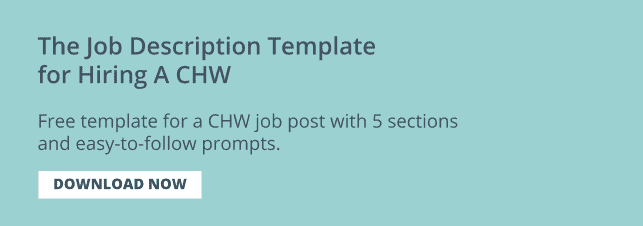As the person responsible for interviewing or hiring, you’re in charge of finding the ideal community health workers (CHWs) for your team.
Before you start talking to any candidates, you should come up with a list of questions you can ask them. These questions will vary depending on the specifics of the job and should be developed with others working on hiring. (Read this interview guide for how to hire a CHW if you want more in-depth information about the interview process.)
However, if you need some ideas to spark your brainstorm, start with these questions that will let you assess someone’s personality and qualifications for the job. Having a range of questions to choose from will help you when it comes to finding a good match for your agency, the community and the other people on your team.
Here are 10 interview questions to help you assess a candidate’s skills, experience and fit for the role:
We have built our company around helping agencies understand the needs of learners. Our needs assessment process helps managers and administrators build the right remote training program.
If your team is in need of a training needs assessment, book a consultation and our experts will provide valuable resources to help you achieve success.
1. What inspired you to become a CHW? Or, if they’re new to the position, “Why do you want to be a CHW?”
This question can help you understand the candidate’s motivation for pursuing a career as a CHW. Look for answers that demonstrate a passion for helping others and a commitment to improving health outcomes in underserved communities.
Candidates who have personal experience with health disparities or have been impacted by a CHW in their own lives may also bring valuable perspectives to the role.
2. What experience do you have working with our community?
Specify what community they’ll be working with, such as migrant workers, pregnant women, congregants, etc.
This question is important in uncovering a candidate’s experience and understanding of the communities they will be serving as a CHW.
Look for answers that demonstrate a deep understanding of the unique challenges faced by your community, as well as experience working with diverse populations. Candidates who have experience working with specific populations, such as immigrants, refugees or low-income families, may also bring valuable skills and insights to the role.
3. How do you approach building trust with clients?
Building trust is a critical component of the CHW role, as it allows clients to feel comfortable sharing personal information and seeking guidance.
Look for candidates who prioritize building relationships with clients, and who have experience using active listening and empathy to establish trust. Ask for specific examples of how they have built trust with clients in the past, and how they would approach building trust with clients in the community you serve.
4. Can you describe your experience in promoting healthy lifestyles?
If the candidate is new to the role, you can as them for an example of when they influenced someone they know, such as a family member or coworker, regarding their health.
Either way, you’ll uncover information on how much they know about what’s likely to be their core job function. You can find out their current level of expertise as well as what kind of communication skills they have. If they have more experience as a CHW, you can also learn what kind of work they’ve done on program development or implementation.
5. How do you handle communication challenges when working with others?
Here, you’re trying to see how the candidate will work with others. This will tell you their adaptability when working with people from a different cultural background or those with low health literacy. You also want to find out how they communicate with people who might not be ready for personal change.
If they’ve had some motivational interviewing training, you’ll know about it with this question.
6. Tell me about a time when you worked as a leader.
Every CHW is a leader. They not only guide and support their clients but also demonstrate leadership among their colleagues. By encouraging them to share instances where they assumed a leadership position, either within their professional environment or in their community, you can gain insight into their ability to effectively lead others.
7. Can you share an example of a challenging situation you faced as a CHW and how you resolved it?
This question evaluates the candidate’s problem-solving skills and their ability to navigate challenges in the field. Look for candidates who can provide specific examples of difficult situations they have encountered, demonstrate critical thinking and decision-making abilities, and show resilience in finding effective solutions while maintaining a client-centered approach.
8. How do you stay aware of what’s happening in your community?
CHWs not only work with a community, but they’re members of the community. Find out how plugged in they are with the people around them. By doing so, you’ll uncover:
- If they have experience with community engagement
- How resourceful they are
- How good they are at relationship-building
- How well they understand the community they’ll be working with
9. Provide an example of when you disagreed with a supervisor.
CHWs will work with many people, ranging from clients to partners to parts of a healthcare team. You want to find how they handle conflict or what kinds of triggers they may have. You can find out how their critical thinking skills are and how they handle self-reflection and growth.
If they have never disagreed with a supervisor, you might have uncovered an untruth.
10. Tell me something new you learned this week.
Interviews can be stressful and tense. It can be helpful to ask a fun question. Something unexpected like this can break the tension and also get the candidate’s creative thinking flowing. Plus, you also might learn something new that will benefit you!


